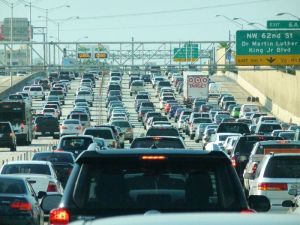We Are Breathing Oil in Our Big Cities

In three different studies presented at the American Association for the Advancement of Science‘s annual meeting in Boston last weekend, researchers "provided mounting evidence that air pollution can both increase the risk of cardiovascular disease in the long-term and induce heart attacks within hours of traffic exposure." While the studies have yet to be released in full, the Guardian reveals some details from the presentations made at AAAS:
John Incardona, of the National Oceanic and Atmospheric Administration, reported research on a type of polycyclic aromatic hydrocarbon (PAHs) that has been ignored by scientists… He said: "The distribution of airborne PAHs really mirrors what is in oil and its refined products. So in essence we are breathing aerosolised oil spill in our big cities."
His work began when looking at how PAHs from oil had damaged the developing hearts of Pacific herring and pink salmon embryos after the Exxon Valdez spill of 1989. "When we first started studying the effects of oil on fish embryos I really never thought it would be applicable to human health," he said. "It turns out that fish hearts even in the embryo function more like human hearts than even mice or rats – the usual test animals in human health studies."
He believes the levels of the chemicals present when oil is burned are high enough to be pharmacologically active in the human bloodstream.
In another study, Lung Chi Chen, of the New York University School of Medicine, reported research where he exposed one group of mice to second-hand cigarette smoke equivalent to passively smoking three or four cigarettes a day and a second group to the fine particles present in air pollution, in concentrations similar to a big city. He found that both particles and smoke produced around the same amount of change in the hardening of the arteries, which can lead to heart attacks.
Photo: plakboek/Flickr
